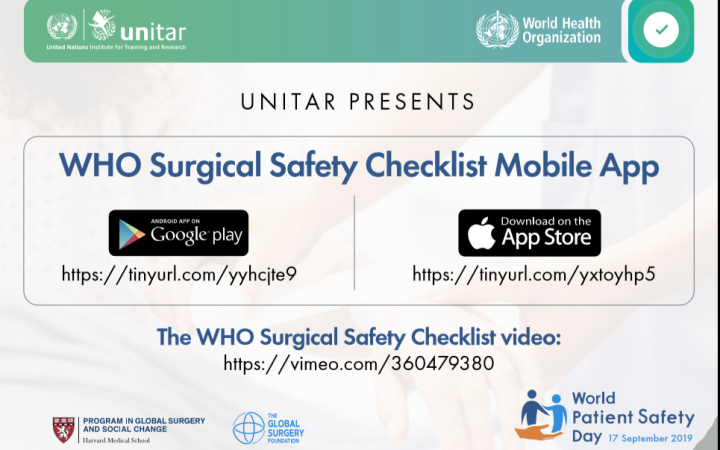17 September 2019, Geneva, Switzerland – The United Nations Institute for Training and Research (UNITAR), the World Health Organization (WHO), the United Nations International Computing Center (UNICC) and the Harvard Medical School Program in Global Surgery and Social Change (PGSSC) are partnering to promote a new mobile application for the WHO’s Surgical Safety Checklist, which is destined to facilitate its use among healthcare professionals. The dissemination of the mobile feature is enhanced through a video that aims of raising awareness of the Checklist’s importance and added value.
It was anticipated for the 10-year Surgical Safety Checklist anniversary. The mobile application and awareness video were launched as part of the first official World Patient Safety Day on September 17th 2019, which brought together attendees from all stakeholder organizations, as well as prominent members of the healthcare world.
Mr. Nikhil Seth, UN Assistant Secretary-General and Executive Director of UNITAR, delivered opening remarks, accentuating the importance of Safe Surgery and its essential link to achieving Universal Health Care (UHC) while realizing the Sustainable Development Goal 3 on Good Health and Wellbeing.
WHO Surgical Safety Checklist
In addition to launching the mobile application and video, the event further aimed to create conclusive dialogues on how to globally implement tools to improve patient safety and surgical care. These were facilitated through a roundtable discussion on the challenges related to the topic.
In reference to Mr. Seth’s observations, it is important to highlight that at the heart of Universal Health Coverage is extending safe care. It has been clearly shown that UHC and other important health related objectives outlined in the SDGs are not achievable without ensuring that global surgical care is accessible, safe, timely and affordable. Despite this reality, more than 90% of the world’s poor lack access to basic surgical care.
The WHO Surgical Safety Checklist was developed to decrease errors and adverse events, and increase teamwork and communication in surgery. It has shown significant reduction in both morbidity and mortality, therefore making it a successful tool to increase patient safety.
Given the invaluable results of this partnership, UNITAR looks forward to future collaborations with WHO, UNICC and PGSSC and will continue enhancing the content and format of its training activities related to health and development.


